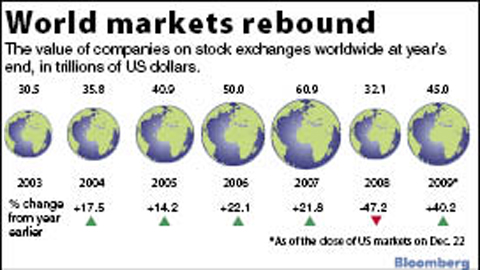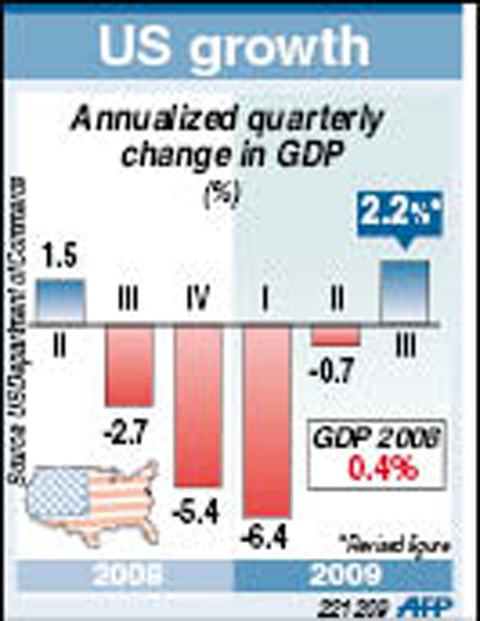Wall Street prepares to close out the year on an upbeat note with the market holding hefty gains from a stunning comeback following a disastrous start to the year.
The stock market enters the final week of trading at its highs for the year on the heels of a stunning nine-month rally that lifted the main indexes from their lowest levels in over a decade.
The final four trading days of the year in the upcoming holiday-shortened week are expected to see light activity and a favorable mood, with the market enjoying a so-called Santa Claus rally.

In the holiday week ending on Thursday, the Dow Jones Industrial Average climbed 1.85 percent to 10,520.10, its best level in nearly 15 months.
The tech-rich NASDAQ composite meanwhile rallied 3.35 percent to 2285.69 and the broad Standard & Poor’s 500 index advanced 2.18 percent to 1,126.48.
Fred Dickson, market strategist at DA Davidson & Co, said the mood on Wall Street should remain positive through the coming week.

“Trading activity should pick up next week as investors make last minute portfolio changes like tax-loss sales and portfolio rebalancing,” he said. “We still expect to see the minor Santa Claus rally continue through New Year’s Eve.”
Some said the upbeat mood was helped by a steepening of the yield curve — or a rise in the difference between short-term and long-term bond rates. Analysts say this is a positive sign because it encourages lending and risk taking.
The opposite phenomenon, an inverted yield curve, suggested recession was coming in 2007.
The yield curve is “a good barometer of the health of the US economy,” said Chris Gaffney at EverBank World Markets, who added that the difference between the short and long bonds rose to a record high in the past week.
With the year almost over, the Dow blue-chip index is sitting on gains for this year of 19.87 percent, with the NASDAQ up 44.94 percent and S&P index ahead 24.71 percent.
Although the market remains well below highs hit in 2007 and is stuck near levels from a decade ago, many traders are satisfied with a positive year.
“The year now ending will be remembered more for what didn’t happen, than what did,” said Peter Buchanan, an economist at CIBC World Markets.
Buchanan said the year opened “with talk of financial and economic Armageddon,” but that a recovery came with surprising speed.
“Few developments have been more striking than the turnaround in equity markets,” he said.
Many analysts say that following the stomach-turning ups and downs over the past months, the stock market may be fairly valued, leaving the possibility of an extension of gains into next year.
“We have made a lot of progress during 2009 and we have a lot more to make,” said John Wilson, equity strategist at Morgan Keegan. “This has been a difficult decade for investors. If history is any example, the next decade should provide a more favorable environment.”
Bonds fell amid a shift to equities in the past week. The yield on the 10-year Treasury bond increased to 3.807 percent from 3.546 percent a week earlier while that on the 30-year bond rose to 4.687 percent from 4.458 percent. Bond yields and prices move in opposite directions.

MORE VISITORS: The Tourism Administration said that it is seeing positive prospects in its efforts to expand the tourism market in North America and Europe Taiwan has been ranked as the cheapest place in the world to travel to this year, based on a list recommended by NerdWallet. The San Francisco-based personal finance company said that Taiwan topped the list of 16 nations it chose for budget travelers because US tourists do not need visas and travelers can easily have a good meal for less than US$10. A bus ride in Taipei costs just under US$0.50, while subway rides start at US$0.60, the firm said, adding that public transportation in Taiwan is easy to navigate. The firm also called Taiwan a “food lover’s paradise,” citing inexpensive breakfast stalls

TRADE: A mandatory declaration of origin for manufactured goods bound for the US is to take effect on May 7 to block China from exploiting Taiwan’s trade channels All products manufactured in Taiwan and exported to the US must include a signed declaration of origin starting on May 7, the Bureau of Foreign Trade announced yesterday. US President Donald Trump on April 2 imposed a 32 percent tariff on imports from Taiwan, but one week later announced a 90-day pause on its implementation. However, a universal 10 percent tariff was immediately applied to most imports from around the world. On April 12, the Trump administration further exempted computers, smartphones and semiconductors from the new tariffs. In response, President William Lai’s (賴清德) administration has introduced a series of countermeasures to support affected

CROSS-STRAIT: The vast majority of Taiwanese support maintaining the ‘status quo,’ while concern is rising about Beijing’s influence operations More than eight out of 10 Taiwanese reject Beijing’s “one country, two systems” framework for cross-strait relations, according to a survey released by the Mainland Affairs Council (MAC) on Thursday. The MAC’s latest quarterly survey found that 84.4 percent of respondents opposed Beijing’s “one country, two systems” formula for handling cross-strait relations — a figure consistent with past polling. Over the past three years, opposition to the framework has remained high, ranging from a low of 83.6 percent in April 2023 to a peak of 89.6 percent in April last year. In the most recent poll, 82.5 percent also rejected China’s

PLUGGING HOLES: The amendments would bring the legislation in line with systems found in other countries such as Japan and the US, Legislator Chen Kuan-ting said Democratic Progressive Party (DPP) Legislator Chen Kuan-ting (陳冠廷) has proposed amending national security legislation amid a spate of espionage cases. Potential gaps in security vetting procedures for personnel with access to sensitive information prompted him to propose the amendments, which would introduce changes to Article 14 of the Classified National Security Information Protection Act (國家機密保護法), Chen said yesterday. The proposal, which aims to enhance interagency vetting procedures and reduce the risk of classified information leaks, would establish a comprehensive security clearance system in Taiwan, he said. The amendment would require character and loyalty checks for civil servants and intelligence personnel prior to